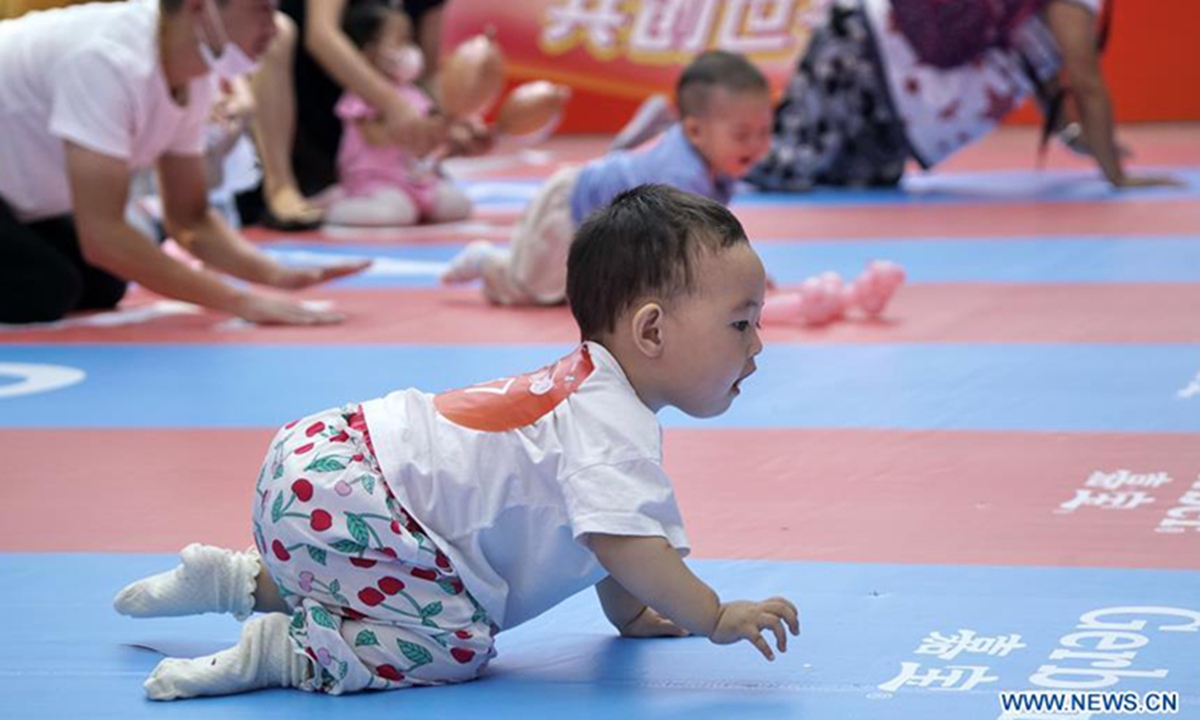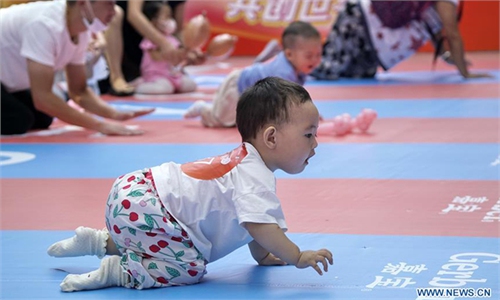
Babies participate in a baby crawling contest at a shopping center in Daxing District, Beijing, capital of China, Sept. 13, 2020. (Xinhua/Li Xin)
Many motions and proposals submitted for China's annual two sessions, which are scheduled to kick off at the weekend, focus on boosting the low birth rate, after the Chinese mainland recorded negative population growth in 2022, the first time in 61 years. Suggestions include scrapping the requirement to be legally married to register and give birth, and granting children born to unmarried parents equal rights.
Xie Wenmin, a member of the National Committee of the Chinese People's Political Consultative Conference (CPPCC), is going to submit a proposal to do away with the need to be married to give birth, and to allow all the newborns to be eligible for household registration, no matter the circumstances of their birth. This means that unmarried parents, or those who have more than three children, would be able to register their children legally.
She also called to grant equal rights to children born to unmarried parents, such as schooling, healthcare and employment, according to her proposal which was viewed by the Global Times on Wednesday.
In China, before women can have access to birth-related services or enjoy preferential policies including birth insurance, they should first of all register the births of their children and the number of their children. Getting married is a premise for this registration.
Some of China's most populous and prosperous provinces and regions, including South China's Guangdong, Southwest China's Sichuan and East China's Shanghai, are among the forerunners to have already canceled such restrictions.
The first session of the 14th National People's Congress is scheduled to open on March 5, and the first session of the 14th CPPCC National Committee is set to begin on March 4.
Boosting the birth rate is a hot topic for this year's two sessions. Yang Xiaoqin, a CPPCC member from Sichuan Province, proposed exempting all medical fees related to childbirth and slashing mortgage rates for families with three children.
Her view echoes that of Zhu Lieyu, an NPC deputy and a Guangzhou-based lawyer who advocates granting rights and treatment for unmarried women to have children that are equal to those of married women, and to scrap China's family planning policies completely to boost the country's fertility rate.
In 2022, China's overall population fell by 850,000 from the previous year, with the national population growth rate at -0.6 per thousand, the country's National Statistics Bureau announced on Tuesday. Last month, the bureau announced that the population in the Chinese mainland recorded negative growth for the first time in 61 years.
Jiang Shengnan, a member of CPPCC National Committee told the Global Times she proposed to guarantee that young people work only eight hours per day so that "they can have sufficient time to fall in love, get married and have children."
She believed that as the brutal "996" work culture has become normal in some companies in China, many youngsters in this country do not have personal lives, thus the marriage and birth rates keep declining. "Giving young people more time for leisure will keep society more vibrant," Jiang said.
Some CPPCC members have formed proposals which would relieve the financial burdens of bringing up children.
Gan Huatian, a CPPCC member, proposed offering free education for the third child of a family, and to provide education subsidies for families with two or three children.
Gan said that allowing families to have three instead of two children did not achieve the desired result, and education is one of the major barriers.
In May 2021, China announced that it would allow couples to have up to three children.
Gan also proposed to offer free healthcare for children under the age of 6, and offering tax discounts for family with children.


